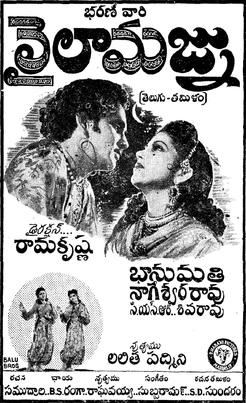Laila Majnu (1949 film)
| Laila Majnu | |
|---|---|

Theatrical release poster
|
|
| Directed by | P. S. Ramakrishna Rao |
| Produced by | P. S. Ramakrishna Rao Bhanumathi Ramakrishna (Presents) |
| Written by |
Samudrala Sr (story / dialogues) |
| Screenplay by | P. S. Ramakrishna Rao |
| Based on | Sufi's Laila-Majnu |
| Starring |
Akkineni Nageswara Rao Bhanumathi Ramakrishna |
| Music by | C. R. Subburaman |
| Cinematography | B. S. Ranga |
| Edited by | P. S. Ramakrishna Rao |
|
Production
company |
|
|
Release date
|
|
|
Running time
|
169 mins |
| Country | India |
| Language | Telugu |
| Laila Majnu | |
|---|---|
| Film score by C. R. Subburaman | |
| Released | 1949 |
| Genre | Soundtrack |
| Length | 47:25 |
| Producer | C. R. Subburaman |
Laila Majnu is a 1949 Telugu historical film, based on the Sufi Legend of Laila-Majnu, produced and directed by P. S. Ramakrishna Rao on Bharani Pictures banner. Starring Akkineni Nageswara Rao, Bhanumathi Ramakrishna in the lead roles and music composed by C. R. Subburaman. The film was simultaneously released in Tamil with same title. The film recorded as Super Hit at the box office.
Laila (Bhanumathi Ramakrishna) is the daughter of Ameer Sarvaar (Mukkamala), and Khais (Akkineni Nageswara Rao), the son of Ameer Umri (Arani Satyanarayana). Love blossoms between Laila and Khais as they grow up. Ameer Sarvaar, unable to dissuade his daughter from seeing Khais, shifts to Mecca. Khais follows her to Mecca and roams in the streets uttering her name. People take him to be a mad person (Majnu) and throw stones at him. The story takes a lot of twists and turns from here on. The King of Iraq (C.S.R), who comes on a visit to Mecca, sees Laila and decides to marry her. Meanwhile, Ameer Umri pleads with his erstwhile friend Sarvaar to save his son. Sarvaar agrees to get his daughter married to Khais if it is proved that he is not mad. A test is conducted and Khais emerges successful. Just when the marriage is to be performed, Sarvaar receives a proposal from the King of Iraq that he wishes to marry Laila. Sarvaar changes his mind, and performs his daughter’s marriage with the King. Laila leaves for Iraq and Khais wanders aimlessly in the desert. The King already has a mistress Zareena (Sriranjani Jr). On coming to know of Laila’s story, she tries to help her. Soon thereafter, the Prince to repents, calls Laila his sister and sends her back to Khais. The lovers are about to meet in the desert, but fate wills it otherwise and a heavy sandstorm takes its toll.
Music composed by C. R. Subburaman. Lyrics by Samudrala Sr. The song Preme Neramouna is evergreen blockbuster. Music released on AVM Audio Company.
Laila Majnu story was first made as a silent film in 1922 by J. J. Madan and again in 1927 by Manilal Joshi. Noted filmmaker Kanjibhai Rathod made it in Hindi in 1931 after the films became talkies. J. J. Madan remade it in Hindi in 1931. In 1936, it was produced by East India Pictures in Persian. In 1940, Dharmaveer Singh made the same story in Punjabi, and in 1941, Sarnad Pictures made a version in Pushtu language. In 1945 it was made in Hindi featuring Swaran Lata as Leila and Nazir Ahmed as Majnu. It was a box-office hit.
...
Wikipedia
